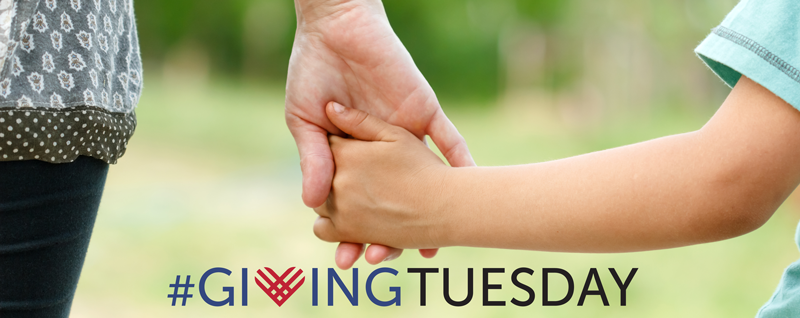“The best way to find yourself is to lose yourself in the service of others” – Mahatma Ghandi
Giving Never Felt So Good!
At American SPCC, we are gearing up to celebrate one of the most anticipated days of the year, #GivingTuesday, and we are hoping you will join us. #GivingTuesday harnesses the potential of social media and the generosity of caring people like you, and unites us all by sharing our capacity to care for and empower one another.
Help others through the Gift of your Time, Donations, or your Voice.
Giving Back • For Social Good
Why Give?
Did you know that giving is not only good for your mental health, it’s also good for your physical health, longevity and even helps you sleep better at night.
Why does giving make us feel so happy?
In 2008, Harvard Business School professor Michael Norton conducted a study which found that gifting money to others actually lifted participants happiness more than if they were to spend it on themselves (contrary to participants prediction that spending it on themselves would make them happier). Similar results were found when Happiness expert Sonja Lyubormirsky, a psychology professor at the University of California, asked people to perform five acts of kindness each week for six weeks.
This “warm glow” effect is a result of the activation of the region of the brain associated with pleasure, social connection and trust. Altruistic behavior releases endorphins in the brain, which produces a positive feeling, otherwise known as the “helper’s high.”
Giving is Good for Your Health & Promotes Longevity
Better health has been linked to generosity, even among the sick and elderly, a wide range of studies have found. Research conducted by the University of California found that elderly people who volunteered were 44% more likely to live longer than those who did not volunteer.
Similar results from a University of Michigan study concluded that elderly couples who provided practical help to family, friends or neighbors, or gave emotional support to their spouses, had higher longevity than those who did not.
One reason giving may improve physical health and longevity is that it helps decrease stress, which is associated with a variety of health problems. A study of people who provided support to others conducted by Johns Hopkins University, showed that those who gave of themselves had lower blood pressure than participants who did not, suggesting a direct physiological benefit to support that giving is good for your health.
Giving Encourages Connection and Cooperation
When you give to others, others are more likely to reciprocate and give back. Generosity is likely to be rewarded down the line – from the person you gave to, or by someone else. Trust and connection are strengthened when we exchange good, ultimately enhancing our bond with others. Research has shown that positive social interactions are key to good mental and physical health. In the book, “Loneliness: Human Nature and the Need for Social Connection,” author John Cacioppo writes, “the more extensive the reciprocal altruism born of social connection . . . the greater the advance toward health, wealth, and happiness.”
Being kind and generous not only leads us to feel closer to others, but also leads others to feel closer to us. It also allows us to perceive others more positively and fosters a greater sense of cooperation in our community.
Giving is Contagious
Giving, in addition to helping the immediate recipient of our gift, can also spread a ripple effect of generosity to those around us.
A joint study by the University of California and Harvard shows that when one person behaves generously, it inspires others to behave generously later on. The study concluded that ”each person in a network can influence dozens or even hundreds of people, some of whom he or she does not know and has not met.”
Giving has also been known to release Oxytocin, the hormone responsible for euphoria, warmth and connection to others. This release of Oxytocin can allow people to feel more empathy toward others and cause them to give more generously of themselves. These people can potentially jump-start a “virtuous circle, where one person’s generous behavior triggers another’s,” says the study.
Giving Awakens Gratitude
Receiving or giving a gift evokes feelings of gratitude, an emotion of expressing appreciation for what one has. People who regularly practice gratitude have been known to experience more positive emotions, feel more alive, sleep better, express more compassion and kindness and have healthier social bonds and connections.
All proof that cultivating gratitude in your everyday life is beneficial to increasing personal happiness and contentment.
So whether you gift your time, your voice or a donation this holiday season, remember that you are giving yourself back so much more. It may spark generosity through your community and you may find yourself benefiting from health, longevity, happiness and better personal connections in the process.
This November 28th, join the global #GivingTuesday movement and give. Whether it’s your time, a donation, or the power of your voice, it’s easy to give back and amplify small acts of kindness.
What Ways Will You Give?
Your generous gift of time, lending your voice or your donation, will help us bring about real change in our communities for children and families. By involving your friends, family and children, you reward them with the power and beauty of giving back to help others.
Let’s all come together this #GivingTuesday and make our voices bigger and louder for abused and bullied children in America!
Together we can promote social change ultimately leading to a safer, healthier and happier world for children.


